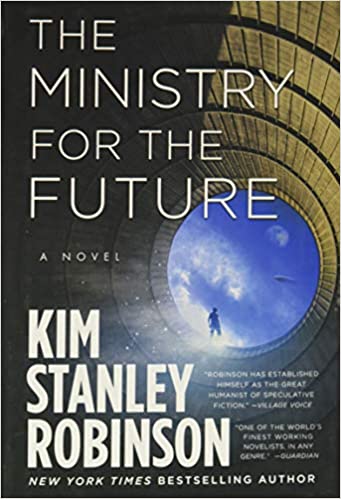You have /5 articles left.
Sign up for a free account or log in.
 The newest book that we will be reading in Bryan Alexander's book club is Kim Stanley Robinson's latest novel, The Ministry for the Future.
The newest book that we will be reading in Bryan Alexander's book club is Kim Stanley Robinson's latest novel, The Ministry for the Future.
Here are three reasons why I'll be reading this book along with Bryan and why you might consider doing so as well.
Enjoyment
The consequences of global warming are serious stuff. Nowadays, however, none of us have the energy reserves to get depressed about anything else. Fortunately, Robinson's novels make for hugely entertaining reads. If you've read his books in the past, you know that they combine fast-moving plots and in-depth character development with a serious dose of science and technology.
Going on Robinson's previous books, the odds are that The Ministry for the Future will entertain and enlighten in equal parts. We all need a distraction from something bigger than the global pandemic, and it may be that a novel about the climate emergency is the only vehicle up to that task.
Higher Ed
Alexander's next JHU Press book will be Universities on Fire: Higher Education in the Age of Climate Crisis. Maybe we can influence some of the writing of that book in this book club.
I see at least three ways that higher ed is in the middle of the climate change story. The first is about teaching and research. Will global warming move to the center of the liberal arts curriculum? Can climate change be an organizing principle for interdisciplinary studies? What sort of resources will universities devote to recruiting and supporting research on energy and society?
The second place where higher ed and the climate crisis come together is on our campuses. Will colleges and universities be leaders in the shift from carbon-producing to clean forms of energy? Will our campuses replace aging fossil fuel-based heating and electricity-generating plants with renewable sources of heat and power? Can we imagine solar panels on every campus roof? Will colleges and universities be early adopters of electric shuttles and battery-powered riding lawn mowers?
The third higher ed area that I think about when it comes to global warming is investments. To what degree are university endowments invested in legacy energy production industries? Might colleges and universities balance the need for robust investment returns with a commitment to only invest in clean energy companies?
Perhaps the book club will address these climate change issues related to higher ed and others that the novel inspires.
Book Technologies
The third reason I'm joining this book club to discuss The Ministry for the Future is book technologies. Here I'm thinking about how the technology of the book is evolving. First, we have the book itself. I'll be reading the novel in a combination of ebook and audiobook. The ebook will be on my dedicated ereader and my phone. The audiobook lives on my phone as well. The syncing of audio and text allows me to read with more enjoyment and at a faster pace. Will your book technology be paper?
The other book technology I'm interested in exploring is the process of how we discuss books. What is an online book club like? How does an online book club compare to one held face-to-face? What does it matter that this is a higher ed book club, made up (mostly, I guess) of higher ed people?
Alexander has just announced this reading choice, so this is an excellent time to start reading. The schedule that he laid out:
- Dec. 7, 2020 -- chapters 1-26 (pp. 1-106)
- Dec. 14, 2020 -- chapters 27- 50 (pp. 107-225)
- Dec. 21, 2020 -- chapters 51-68 (pp. 227-340)
- Dec. 28, 2020 -- chapters 69-88 (pp. 341-443)
- Jan. 4, 2021 -- chapters 89-106 (pp. 445-563)




